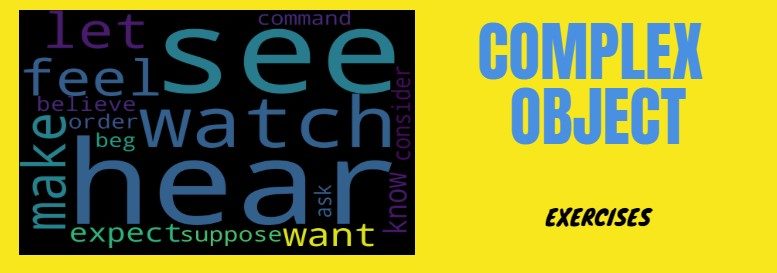Тест Complex Object
Инфинитив образует сложное дополнение с местоимением в объектном падеже (me, you, him, her, us, them, it) или с существительным в общем падеже (John, my sister, our teacher etc.). На русский язык такая конструкция переводится придаточным предложением с союзами «что, чтобы»:
- I want him to help me with my Math homework. — Я хочу, чтобы он помог мне с дом.заданием по математике.
- Mother expected my elder sister to get married in March. — Мама ожидала, что моя старшая сестра выйдет замуж в марте.
Конструкция Complex object употребляется:
- поле глаголов want, expect, would like — с инфинитивом с частицей to
- после восприятия — see, hear, feel, notice, watch — с инфинитивом без частицы to или с причастием настоящего времени
- после глаголов make и let — с инфинитивом без частицы to
- Complex Object
- 4 Comments on Тест Complex Object
- Complex object / complex subject
- 15 Comments on Тест Complex Object / Complex Subject
- Complex object + инфинитив без частицы to
- Complex object после глаголов восприятия
- Сложное дополнение «to have something done»
- 7628 результатов для ‘complex object’
- 10000+ результатов для ‘complex object advanced’
- Complex Object Exercises.
Complex Object
1. Why didn»t you let ____ his own way?
a) him have
b) he has
c) him to have
2. The room was very crowded, so nobody noticed ___ the room.
a) Jimmy leaving
b) Jimmy to leave
c) Jimmy leave
3. Let ___ whatever they want; I don»t care.
a) they do
b) them do
c) them to do
4. The people on the platform watched ___ at the station.
a) the train arrived
b) the train to arrive
c) the train arrive
5. The basket is full of dirty clothes. Do you ___ to wash them?
a) expect me
b) expect that I
c) expect I
6. I am sorry I didn»t hear ___ my name.
a) you to call
b) that you cal
c) you call
7. Have you ever heard ___ in public places?
a) him to swearing
b) him swear
c) him to swear
8. Mary had nothing to read and I advised ___ a few books from the local library.
a) she to borrow
b) her borrow
c) her to borrow
9. Did you watch ___ over that wall?
a) the boys climb
b) the boys to climb
c) the boys to be climbing
10. Your essay will make ___ in his grave.
a) Shakespeare turn
b) that Shakespeare turns
c) Shakespeare to turn
4 Comments on Тест Complex Object
Тест Complex Object / Complex Subject
В английском языке существует несколько синтаксических комплексов — то есть сочетаний двух или нескольких слов, представляющих собой единое синтаксическое целое — один член предложения. Наиболее употребительные из них — сложное дополнение (Complex Object) и сложное подлежащее (Complex Subject). Каждый из этих комплексов состоит из именной части — существительного или местоимения — и глагольной части — инфинитива, герундия или причастия.
На страницах нашего сайта мы подробно мы рассматривали каждую из этих конструкций. Предлагаем вам пройти тест
Complex object / complex subject
a) That I did
b) Me do
c) Me to do
d) For me to do
a) Mary singing
b) That Mary sing
c) Mary sing
d) Mary to sing
a) That he open
b) Him opening
c) Him to open
d) Him open
a) That he must write
b) Us to write
c) Us writing
d) Us write
a) Had my wallet stolen
b) Had stolen my wallet
c) Had my wallet to steal
d) Had my wallet stealing
a) The meeting be cancelled
b) The meeting canceled
c) That the meeting was canceled
d) The meeting to be cancelled
a) Is reported that he is visiting
b) Is reported to be visiting
c) Reported to visit
d) Reported to be visiting
a) Someone breath
b) That someone breath
c) Someone to breath
d) Someone breathing
a) Is said that she is
b) Said that she to be
c) Is said to be
d) Said to be
a) That he bring
b) Him to bring
c) That he to bring
d) Him bring
15 Comments on Тест Complex Object / Complex Subject
Конструкция Complex Object — сложное дополнение, несмотря на свое пугающее название, на самом деле довольно проста. Рассмотрим следующие предложения:
- Я хочу, чтобы ты сходил в магазин.
- Я хотел бы, чтобы ты поиграл с ребенком.
- Я видел, что он перешел дорогу
В русском языке такие фразы строятся при помощи придаточного предложения. В английском языке такие предложения образуются при помощи специальной конструкции — Complex Object — сложного дополнения.
Сложное дополнение может состоять из прямого дополнения + инфинитив с частицей to или без to / ing-овая форма глагола, что зависит от глагола сказуемого.
Поэтому наши примеры будут выглядеть на английском языке следующим образом:
- I want you to go to the shop
- I would like you to play with the child
- I saw him cross the street
Все эти сложные дополнения переводятся на русский язык придаточными дополнительными предложениями, начинающимися с союзов как, чтобы, что
Конструкция Complex object + инфинитив с частицей to употребляется после глаголов:

- Mother wants me to get good marks at school. – Мама хочет, чтобы я получал хорошие оценки в школе.
- We know him to speak Spanish well. – Мы знаем, что он хорошо говорит по-испански.
- Would you like me to help you with Math? – Ты бы хотел, чтобы я помог тебе с математикой?
- The teacher expected the students to hand in the tests at once. – Учитель ожидал, что ученики сдадут контрольные работы сразу же.
- I’d like you to smile. — Мне бы хотелось, чтобы ты улыбнулась.
- I would prefer you to return home by taxi. It’s late – Я бы предпочел, чтобы ты вернулась домой на такси. Уже поздно.
со следующими глаголами также употребляется конструкция ‘object + infinitive’:
advise, allow, beg, cause, command, compel, encourage, expect, forbid, force, get, hate, help, instruct, intend, invite, leave, love, mean, need, oblige, order, permit, prefer, recommend, remind, request, teach, tempt, trouble, want, warn, wish
Complex object + инфинитив без частицы to
Конструкция Complex object + инфинитив без частицы to употребляется после глаголов make – заставлять и let – позволять, разрешать
- Don’t make me drink milk, I hate it! – Не заставляй меня пить молоко, я его ненавижу!
- In my childhood my parents made me learn to play the piano В детстве родители заставляли меня учиться играть на пианино.
- Let the children play in the park, the weather is wonderful. – Разрешите детям поиграть в парке, погода великолепная.
- Don’t let her go there alone, she may get lost. – Не позволяйте ей идти туда одной, она может заблудиться.
Complex object после глаголов восприятия
После глаголов восприятия
употребляется либо инфинитив без частицы to, либо ing-овая форма глагола
Разница между использованием инфинитива (do) и ing-овой формы глагола (doing) в следующем: если объект начал и закончил действие, то есть, действие полностью завершено, то употребляется инфинитив без частицы to (do), если объект был в процессе действия и действие не закончено, то употребляется ing-овая форма (doing)
Сравним два предложения:
- Я видел, как он открыл окно – действие завершено: окно открыто. В русском языке использован глагол совершенного вида: открыл – что сделал? Поэтому на английский это предложение будет переведено при помощи инфинитива без частицы to: I saw him open the window
- Я видел, как он открывал окно – то есть, я видел, как происходил сам процесс: окно открывалось. Здесь использован глагол несовершенного вида: открывал – что делал? Поэтому в английском языке здесь будет использована ing-овая форма глагола: I saw him opening the window.
- We saw her crossing the river – Мы видели, как она переплывает реку.
- I felt somebody touch my shoulder. – Я почувствовал, как кто-то тронул меня за плечо.
- I didn’t notice him put the letter on the table. – Я не заметила, как он положил на стол письмо.
- At the zoo we often watched monkeys playing in their cage. – В зоопарке мы часто наблюдали, как обезьянки играют в своей клетке.
- I often hear him playing the violin in his room. — Я часто слышу, как он играет на скрипке у себя в комнате.
Видеоурок по английскому языку: Complex Object – Сложное дополнение
Сложное дополнение «to have something done»
Конструкция «to have something done» обозначает, что действие, выраженное глаголом сказуемым + причастие прошедшего времени (V3), совершает не само лицо, а кто-то другой по просьбе или приказу действующего лица.
- I want to have my hair cut – Я хочу подстричься (то есть, я не сам себя буду стричь, это будет делать по моей просьбе парикмахер)
- Father had his car repaired yesterday – Папа починил машину (то есть, ему в мастерской починил ее механик)
- You should have this carpet cleaned – Тебе нужно почистить ковер (отдать его в чистку)
- She had her children looked after in the evening when she went out – За ее детьми присматривали вечером, когда она ушла.
- Where do you usually have your dress made? – Где тебе обычно шьют платья?
Предлагаем вам пройти небольшой тест на тему «Сложное дополнение»
1. We looked at the sky and saw ___ in the clouds.
a) the plane disappear
b) the plane to be disappearing
c) the plane to disappear
2. We expect the Chinese delegation ____ tomorrow.
a) leaving
b) to leaving
c) to leave
3. Mr. Smith didn»t want his daughter ____ an actress.
b) to become
4. We expected ____ in water polo championship.
a) them to take part
b) they to take part
c) them take part
5. Mrs. Edwards usually ___ at home when he feels sick.
a) let her son stay
b) lets her son stay
c) lets het son to stay
6. Betty felt ___ to tremble.
a) her hands begin
b) her hands to begin
c) her hands to beginning
7. Linda is being very rude. I have never heard ___ to her mother like that before.
a) that she talks
b) her talk
c) her to talk
8. I don»t want ___ your grandfather. It’s very impolite of you.
that you disturb
you to disturb
9. The children are making too much noise. I»d like ___ quiet.
a) they to be
b) them to be
c) that they be
10. The last drop makes ___.
a) the cup run over
b) the cup running over
c) the cup to run over

7628 результатов для ‘complex object’
What do you want these people to do? (Complex Object)
The Complex Object
Complex Object
Привести в порядок
Complex Object: Pronouns
Complex Object: Make one sentence
Афанасьева 6 класс
Complex Object 1: Pronouns
-Complex Object-
Привести в порядок
Complex Object: Transform the sentences
Kuz 7 complex object verbs
Complex object — translate
Complex Object expect, know
Привести в порядок
Complex object all types
complex object and complex subject
Барашкова 7 класс Complex Object
Complex object (want, would like)
Copy of Complex Object
complex object teacher_shark
Complex Object teacher_shark
Выиграй или проиграй викторину
Copy of Complex Object
Привести в порядок
Complex Object (more)
Привести в порядок
B2 Lesson 5 Complex Object
Complex Object contest
Complex Object sentences
Привести в порядок
Complex object+ objectives
Complex Object: Pronouns (3)
10000+ результатов для ‘complex object advanced’

Перед вами – подборка упражнений на Complex Object (сложное дополнение) в английском языке. Перед выполнением упражнений обязательно повторите теорию. Правило употребления Complex Object вы найдете здесь.
Complex Object Exercises.
- The teacher asked us ________ (listen) to his explanations.
- He made the students _____________ (write) the composition.
- The teacher let us ____________ (use) the dictionaries.
- The teacher noticed me ____________ (open) my dictionary several times.
- I made myself ____________ ( write) as neatly as I could.
- The teacher watched us _____________ (work) and didn’t say anything.
Упражнение 2. Open the brackets and use the Complex Object.
- Do you want (they / stay) at the hotel?
- I would like (the professor / look through) my report.
- We considered (he /be) an honest person.
- I would like (the dress / buy) by Sunday.
- He doesn’t want (they / be late) for dinner.
Упражнение 3. Combine the sentences using the Complex Object.
- They didn’t notice us. We passed by.
- Mike heard Sam. She was playing the violin.
- I felt her hand. It was shaking.
- I heard them. They were arguing.
- We many times heard him. He told this story.
Упражнение 4. Fill in the correct form of the Infinitive to make Complex Object.
- Our teacher made us _______ (do) this exercise all over again.
- The teacher advised us _______ (rewrite) the test.
- Please, let me _______ (know) when your sister returns from Paris.
- I find your story _______ (be) very unusual and interesting.
- Nick doesn’t want me _______ (tell) everybody this news.
- I watched the cat _______ (crawl) to the flock of sparrows.
- I would like you _______ (be) very accurate and attentive.
Упражнение 5. Choose the correct ending of the sentences.
- to be examined
- to examine
- examined
- being examined
- coming
- come
- came
- to come
- Turn / disappear
- To turn / to disappear
- Turned / disappeared
- to be interrupted
- to interrupt
- interrupted
Упражнение 6. Translate the sentences using Complex Object.
- Я бы хотел, чтобы вы доставили товары к концу месяца.
- Вы сегодня услышите, как она поет.
- Я не ожидал, что Майк – такой невежливый.
- Я слышал, что его имя упоминали на собрании.
- Он не заметил, как мы подошли к нему.
- Я бы хотел, чтобы никто не брал мои вещи.
- Do you want them to stay at the hotel?
- I would like the professor to look through my report.
- We considered him to be an honest person.
- I would like the dress to be bought by Sunday.
- He doesn’t want them to be late for dinner.
- They didn’t notice us pass by.
- Mike heard Sam playing the violin.
- I felt her hand shaking.
- I heard them arguing.
- We many times heard him tell this story.
1 do, 2 to rewrite; 3 know; 4 to be; 5 to tell; 6 crawl; 7 to be
1-a, 2-d, 3-a, 4-c, 5-a
Exercise 6. Варианты перевода.
1) I would like you to deliver the goods by the end of the month.
2) You will hear her sing / singing today.
3) I did not expect Mike to be so impolite.
4) I heard his name be mentioned at the meeting.
5) He did not notice us approach / approaching him.
6) I would like my belongings not to be taken.




